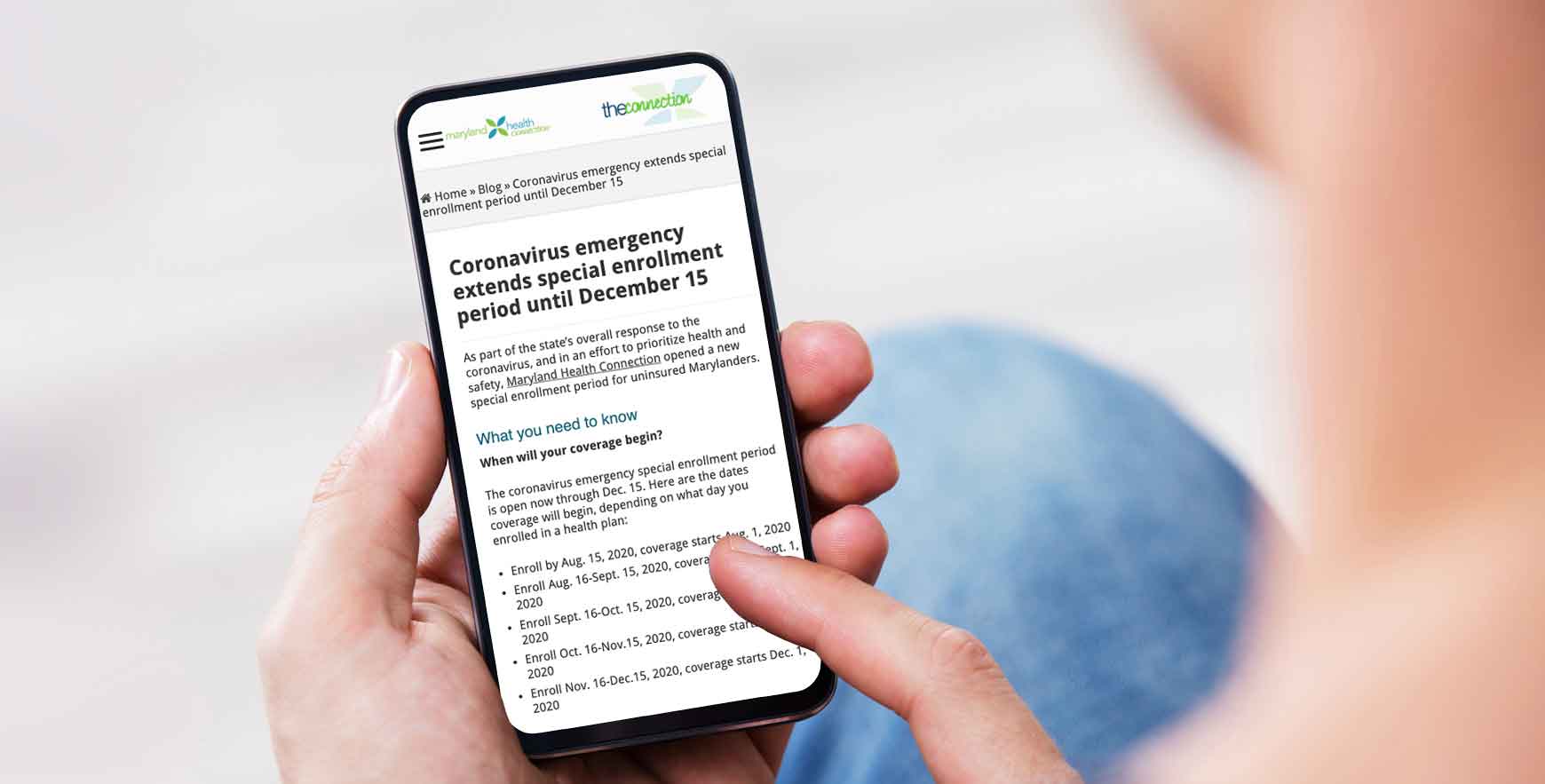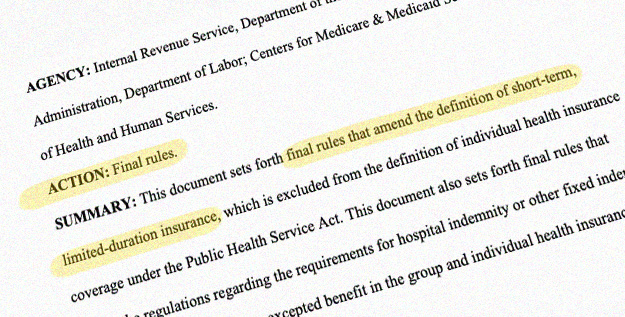
In this edition
- Maryland reopens COVID-19 enrollment window, extends it until Dec. 15
- Most of Pennsylvania’s health insurance marketplace insurers propose rate decreases for 2021
- Kentucky insurers propose average rate increase of 11 percent for 2021
- New insurers offer plans in North Carolina marketplace for 2021
- New Mexico CO-OP will close at the end of 2020, leaving just three CO-OPs in U.S.
- HHS approves New Hampshire reinsurance program
- Nebraskans submit nearly 2,700 applications in first six days of Medicaid expansion enrollment
- Twenty attorneys general express opposition to allowing healthcare sharing ministry expenses to be tax-deductible
Maryland reopens COVID-19 enrollment window, extends it until Dec. 15
Like most of the other state-run exchanges, Maryland Health Connection opened an enrollment window this spring to address the COVID-19 pandemic, allowing uninsured residents to sign up for health insurance, even if they didn’t have a qualifying event. More than 54,000 people had signed up by mid-July, when the window ended. But last week, Maryland Health Connection reopened the special enrollment period and announced that it will continue until December 15. The extension through mid-December will allow uninsured people the option of enrolling with nearly immediate (or even retroactive) coverage – even during open enrollment this fall. (People who use the normal open enrollment window will have coverage effective January 1, 2021; the COVID-19 special enrollment period will allow uninsured Marylanders to get coverage without having to wait until January.)
COVID-19 special enrollment periods are still underway in New York, Vermont, California, and Washington, DC, although Vermont’s ends on Friday and New York’s ends on Saturday (assuming no additional extensions). The federal government opted not to offer a COVID-19 special enrollment period for HealthCare.gov, which is used by residents in 38 states. Democratic lawmakers have long decried that decision, and continue to urge the Trump administration to reconsider. Last week, 25 Democratic Senators sent a letter to the president, asking him to open an enrollment period on HealthCare.gov to allow uninsured residents an opportunity to get health coverage for the remainder of 2020.
Most of Pennsylvania’s health insurance marketplace insurers propose rate decreases for 2021
Pennsylvania’s individual-market insurers have proposed a weighted average rate decrease of about 2.6 percent for 2021. Without Pennsylvania’s newly approved reinsurance program – which will take effect in 2021 – the overall proposed rate changes would likely have amounted to a small increase over 2020 rates, but the reinsurance program is keeping premiums in check.
Highmark Choice Company – one of several Highmark affiliates in Pennsylvania – is discontinuing all of its current plans (which are sold both on- and off-exchange) and will offer just a single Bronze plan outside the exchange for 2021. Highmark Choice Company’s enrollment accounts for less than 1 percent of Pennsylvania’s individual market.
Kentucky’s individual-market insurers propose average rate increase of more than 11 percent for 2021
Kentucky’s two individual-market insurers have proposed average rate increases of 16.6 percent and 5.3 percent. The weighted average proposed rate increase amounts to about 11 percent. This is far higher than the national average thus far: across 20 states where individual-market rate filing data have been made public, the weighted-average proposed premiums increase for 2021 is 1.85 percent. Only New York has a higher overall average proposed rate increase than Kentucky.
New insurers offer plans in North Carolina marketplace for 2021
In keeping with the trend that we’re seeing in numerous states across the country, North Carolina’s health insurance marketplace will gain some new insurers in 2021. Oscar will join the exchange in the Asheville area. UnitedHealthcare will rejoin the exchange, after exiting at the end of 2016, and it appears that Sentara/Optima – which currently offers individual-market coverage in Virginia – will also join North Carolina’s exchange for 2021.
Across the existing insurers in North Carolina’s health insurance exchange, proposed rate changes for 2021 range from a decrease of about 14 percent for Cigna, to an increase of about 6 percent for Ambetter.
New Mexico CO-OP will close at the end of 2020, leaving just three CO-OPs in U.S.
Just four of the original 23 CO-OPs that were created under the ACA are still operational this year, and that will drop to three as of 2021. New Mexico Health Connections announced this week that it will close at the end of 2020; its 14,000 members will need to select new coverage during the open enrollment window that starts November 1, 2020.
The New Mexico Office of the Superintendent of Insurance has published FAQs about the CO-OP closure, clarifying that members do not need to do anything now, and will have an opportunity to pick a new plan during open enrollment (November 1 – December 15). Members who have their coverage through the New Mexico marketplace (HealthCare.gov) will be automatically enrolled in a comparable plan from another insurer if they don’t select their own new plan during open enrollment.
Earlier this summer, New Mexico Health Connections had proposed by far the largest percentage rate increase in New Mexico’s individual market for 2021. The remaining three insurers proposed much more modest rate changes. And two new insurers – Western Sky Community Care (Ambetter/Centene) and Friday Health Plans – will join New Mexico’s exchange for 2021, with plans available for purchase starting in November. So although New Mexico’s CO-OP is closing, the state will go from having four participating exchange insurers to five.
HHS approves New Hampshire reinsurance program
Last week, HHS approved New Hampshire’s 1332 waiver proposal for a reinsurance program. The state expects full-price individual-market premiums to be about 16 percent lower with the reinsurance program than they would otherwise have been, and projects that total individual market enrollment will grow by about 6 percent with the reinsurance program in place.
New Hampshire’s reinsurance program will be funded with a premium assessment on health insurers in New Hampshire, as well as federal pass-through funding. (The federal government will spend less on premium subsidies due to the lower overall premiums, and New Hampshire will get to use the savings to fund its reinsurance program.)
Last month, HHS approved Pennsylvania’s reinsurance proposal. As of 2021, New Hampshire and Pennsylvania will join a dozen other states where active reinsurance programs are keeping individual-market health insurance premiums lower than they would otherwise be, and providing general stability to the markets.
Nebraskans submit nearly 2,700 applications in first six days of Medicaid expansion enrollment
Nebraska’s Medicaid expansion coverage takes effect in October, nearly two years after voters in the state passed a Medicaid expansion ballot measure. Enrollment began on August 1, and in the first six days, 2,692 applications were submitted. Nebraska initially projected that 90,000 people would gain eligibility for coverage under Medicaid expansion, but a Families USA analysis determined that an additional 33,000 people might be eligible due to the widespread job losses caused by the COVID-19 pandemic.
Twenty attorneys general express opposition to allowing healthcare sharing ministry expenses to be tax-deductible
In June, the IRS issued proposed regulations that would allow healthcare sharing ministry expenses and direct primary care expenses to be tax-deductible medical expenses for filers who itemize their deductions, and allow employers to reimburse these membership fees using health reimbursement arrangements. This week, attorneys general from 20 states – led by California Attorney General Xavier Becerra – sent a letter to the IRS, expressing opposition to the proposed rule and asking that it be withdrawn.
The attorneys general note that the proposed rule will increase consumer confusion, making it harder for people to realize that healthcare sharing ministry plans are not real health insurance and should not be considered an adequate substitute for major medical coverage. They also point out that the rule would further segment the market, with healthy people increasingly opting for non-insurance coverage, while sick people remain in the ACA-compliant market. The letter also charges that the proposed rule is arbitrary and capricious, and goes beyond the authority that the IRS has.
Louise Norris is an individual health insurance broker who has been writing about health insurance and health reform since 2006. She has written dozens of opinions and educational pieces about the Affordable Care Act for healthinsurance.org.









